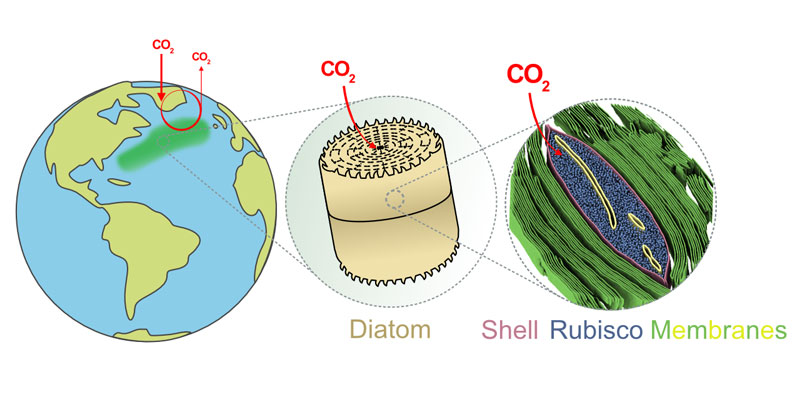Discovery improves our knowledge of CO2-scrubbing algae
Posted on Sunday 6 October 2024

A research team at York have discovered how diatom algae ‘lock in’ carbon dioxide (CO2) so efficiently - a discovery which could lead to new bioengineering solutions to reduce atmospheric CO2 in the future.
Professor Luke Mackinder’s research team at the Centre for Novel Agricultural Products in York's Department of Biology, collaborating with Professor Ben Engel's team at the University of Basel, Switzerland focused on microscopic diatoms, which play a vital role in ‘fixing’ CO2 in the oceans, in turn effectively scrubbing it from the air.
Efficient
They’re so efficient in this role, it’s estimated they are responsible for around 20 percent of the annual removal of CO2 from our atmosphere by photosynthesis, more than the combined action of all of Earth’s rainforests.
The team discovered a protein shell in these algae that encapsulates the CO2-fixing enzyme Rubisco and which is necessary for efficient CO2 fixation by photosynthesis. This groundbreaking discovery can provide ideas for future bioengineering approaches to reduce CO2 in the atmosphere.
Cutting-edge
Using cutting-edge gene editing, protein detection and imaging technologies the researchers were able to reveal the molecular architecture of the Shell protein layer and decipher its function. The results of the study have now been published in Cell alongside an independent study led by Professor Yusuke Matsuda from the Kwansei-Gakuin University in Japan that in parallel discovered the Shell proteins.
Professor Mackinder says: “Around half of global CO2 fixation takes place in our oceans by microscopic algae yet our understanding of how they achieve this multi-billion ton CO2 fixation process is unclear. Here, we identify a key molecular piece of the ocean carbon fixation ‘jigsaw’ that brings us a step closer to understanding how carbon cycles in our oceans.”
“In the future we are excited to see what other new molecular discoveries await as we continue to explore carbon fixation in other ocean algae.”
